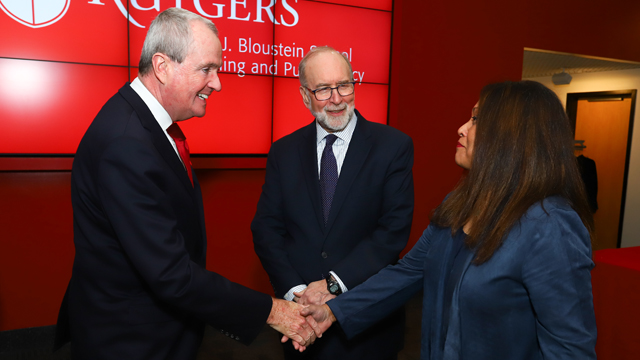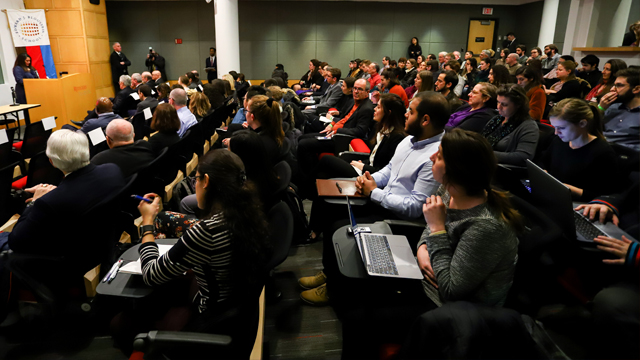by Cecille de Laurentis MPP/MCRP ’20
“It’s a Wednesday evening in the middle of February,” said Governor Phil Murphy knowingly, looking out at his audience, some of whom seemed to guess what was coming next. “The Scarlet Knights’ tipoff against Michigan in less than two hours, and yet you’re showing such devotion by being here tonight.” Governor Murphy grinned, and the audience laughed along. “But if you think I’m going to keep you here past tipoff time, don’t worry–I’m going to the game too.”

Governor Murphy emphasized his affinity for Rutgers and the Bloustein School multiple times during his remarks on Wednesday, February 19, at the Governor James J. Florio Special Events Forum in the school’s Civic Square Building.
The governor was delivering the Gov. James J. Florio Distinguished Visiting Scholar in Public Policy Lecture at Bloustein, unveiling a bevy of ethics reforms that aim to change the culture of New Jersey’s government.
Governor Florio was also in attendance, and both Murphy and Professor Carl Van Horn, who introduced the lecture, praised the former governor’s nearly 50-year history of public service in the statehouse, as the governor, and at the Bloustein School. Professor Van Horn praised Governor Florio’s commitment to “evidence-based policy solutions to help those in need,” which Governor Murphy echoed.

As Murphy recalled, Governor Florio also once introduced a comprehensive set of ethics reforms for New Jersey’s government at an institution of higher education, in that case Montclair State College (now Montclair State University.)
“I am proud,” Murphy said, “nearly 28 years to the day later, to stand before another group of New Jersey scholars to put forward our administration’s comprehensive plan to modernize the ethics laws of our state, so that the people of NJ can regain faith about the way that business is conducted in the statehouse and so that they can have unprecedented access to our political process.”
Governor Murphy then spoke about some of the ethical challenges that have faced New Jersey’s government: “New Jersey has made national headlines, but for all the wrong reasons,” he said. Now, the ethics reforms for Trenton are happening at multiple levels of government. Governor Murphy stated his intention in the next weeks to use his executive authority to increase transparency in state and local govt by requiring new measures of transparency for those who do business with the state.

There have also been five bills introduced in the state legislature, which the governor believes will pass. One requires more transparency around lobbying (including the end of “shadow lobbying,” requiring that everyone hired to influence government decisions to be disclosed); one eliminates OPRA (Open Public Records Act) exemptions for lawmakers; one prohibits legislators from accepting gifts and restricts their ability to accept outside income; one lengthens the “cooling off” period that former legislators must take before taking work as lobbyists; and one requires any piece of legislation to be made publicly available online for 72 hours before it is voted on in its final form. Governor Murphy joked about a bottle of bourbon that he and his staff received, but cannot touch, because it was a gift.
All jokes aside, the governor expressed seriousness about his commitment to ethics reform. “All parties could do better, and that includes the executive branch and yours truly,” he said. “We are not a perfect society–far from it. But we are perfectable.”
Our perfectability might be debatable to some, but the idea of using policy as a tool to strive towards a more perfect society clearly appeals to many, including surely many of the students in the audience on that Wednesday evening.
